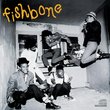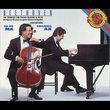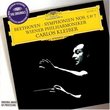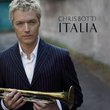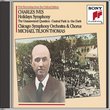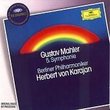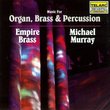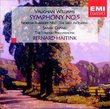| All Artists: Max Bruch, Sir Alexander Mackenzie, Sir John Blackwood McEwen, Rachel Barton Pine Title: Scottish Fantasies for Violin and Orchestra with Rachel Pine (2 CDs) Members Wishing: 3 Total Copies: 0 Label: Cedille Release Date: 6/28/2005 Genres: Special Interest, Classical Styles: Chamber Music, Forms & Genres, Concertos, Instruments, Strings, Symphonies Number of Discs: 2 SwapaCD Credits: 2 UPCs: 735131908320, 669910245767 |
Search - Max Bruch, Sir Alexander Mackenzie, Sir John Blackwood McEwen :: Scottish Fantasies for Violin and Orchestra with Rachel Pine (2 CDs)
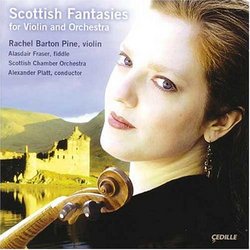 | Max Bruch, Sir Alexander Mackenzie, Sir John Blackwood McEwen Scottish Fantasies for Violin and Orchestra with Rachel Pine (2 CDs) Genres: Special Interest, Classical
Rachel Barton Pine's brand new disc of Celtic flavored works is the first to present Bruch's beloved Scottish Fantasy in an insightful and virtuosic interpretation that highlights its Scottish roots. The album also feat... more » |
Larger Image |
CD DetailsSynopsis
Album Description Rachel Barton Pine's brand new disc of Celtic flavored works is the first to present Bruch's beloved Scottish Fantasy in an insightful and virtuosic interpretation that highlights its Scottish roots. The album also features Sarasate's Airs Ecossais* and two pieces by Scottish composers: Mackenzie's Pibroch Suite and McEwen's Scottish Rhapsody "Prince Charlie."* Ms. Pine's own Medley of Scots Tunes,* arranged and performed with famed Scottish fiddler Alasdair Fraser is also included. As a bonus, the package includes a video documentary on the making of Scottish Fantasies. Similar CDs
Similarly Requested CDs
|
CD ReviewsReally, really good mcerner | Princeton, NJ United States | 06/30/2005 (5 out of 5 stars) "A very pleasant, often lively, evocative and enjoyable set of CDs. The video documentary included in the second CD tells about how Barton Pine studied Celtic/Scottish music before making her recording, and the extra work shows in her ability to render the Bruch as a far lovelier recording than any other violinst has. She finds the tensions, the delicacies and the warmth of this piece. Add to that, the Sarasate is also beautifully done -- sorry it was so short a piece. On the second CD, the Mackenzie and the McEwen, not heard that often, are also really well done. This isn't fiddling -- you get true classical versions of the folk tunes hidden in these selections. Because of that, Barton Pine brings out nuances that were never before explored, and she does it by showing you just how good, how rich, this music can be. The final piece, Barton Pine's arrangement of scottish tunes, is also enjoyable --a fun way to end an album that is both relaxing and delightful. Highly recommended." Scottish fantasies at their best Vera Kolb | Kenosha, WI | 11/15/2006 (5 out of 5 stars) "This double CD is a real treasure, and a showcase of both the musicianship and scholarship. Rachel Barton Pine has researched both the composers and the history of the performances of the works she has recorded. She has produced the most attractive booklet which goes with the CDs, in which she teaches the subject in an effective, friendly and captivating way. Particularly interesting is her documentation of Sarasate's familiarity with Scottish fiddling. Rachel Barton Pine has also a very attractive and informative web site on which one can find information about this project. Just "Google" her and her site comes right up. I think that her web site is great. One can find the schedule of her concerts and all sorts of interesting educational things. I only wish that all great performers would do the same. Rachel Barton Pine is a virtuoso, but her musicianship shines and it makes her virtuosity just a tool. She is so much more than the flying fingers. In a winning combination with Maestro Alexander Platt, an immensely talented conductor, they have produced a classic which will be listened to for years to come. There may never be a comparable Scottish Fantasy and Pibroch Suite performance. Mr. Platt leaves no note unexpressed. As opposed to the lesser conductors, who sometimes overpower the soloist, or who seek their own limelight at the expense of the soloist, Mr. Platt achieves a perfect union of the soloist and the orchestra, just as it should be. The Scottish Chamber Orchestra is also at its best. These records' main value is in the interpretation, which is insightful and elegant. There are no over-interpretations, however, in which the soloist or orchestra would push their own detailed view of this music. Instead, certain dreaminess is allowed, and the listeners can build their own Scottish Fantasies and become active participants in this music. Sarasate's Airs écossaise is a totally charming piece. The Medley of Scots Tunes, by Rachel Barton Pine and Alasdair Fraser, a master Scottish fiddler, is an event. I admit to listening to it consecutively eight times, and would have listened to it more times, but was afraid of a total addiction. The great art of fiddling, the artists' dreams about their countries of origin, pictures of beautiful Scotland, and the musical finesse and musicianship are all the impressions you will come out with after listening to these great recordings. This review is dedicated to Dr. Andrew B. Dempster for his birthday. Andrew has shown me his native country, Scotland, and guided me through its history. I came back with wonderful memories, and a book of music sheets on Scottish fiddling, my most precious music sheets ever. " Scottish Fantasies For Violin and Orchestra w/ Rachel Pine Steven Clardy | Delavan, Wisconsin | 02/09/2008 (5 out of 5 stars) "A very beautiful piece of music that is brilliantly played by a wonderfully talented violinist. A technicly challenging piece that Ms. Pine truely brings to life."
|

 Track Listings (2) - Disc #1
Track Listings (2) - Disc #1
